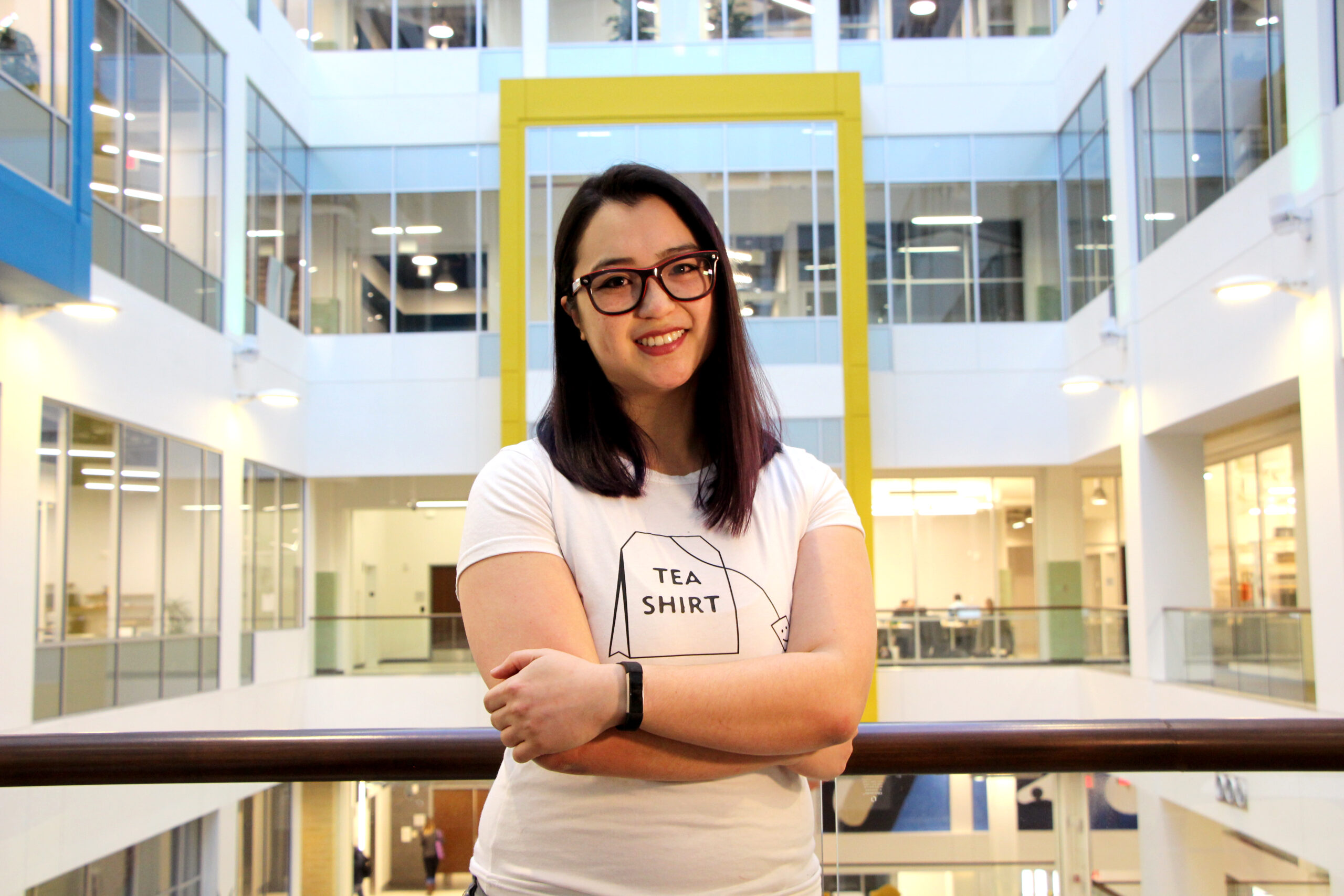Personalizing the Master’s Degree
Duke BME’s MS and MEng programs enable students to customize their learning experience and chase down opportunities

Leah Machlin didn’t expect to be working in an old tobacco factory in downtown Durham after graduating with a degree in biomedical engineering. With its façade still painted with advertisements for Liggett & Myers cigarettes, the Chesterfield building doesn’t appear to have changed much since its construction in 1948. But inside it’s a different world––one with renovated lab spaces where biomedical engineers, like Machlin, can tackle cutting-edge issues in modern medicine.
Machlin is a research associate with Element Genomics, a biotech startup founded by Duke University faculty members Charles Gersbach, Greg Crawford, Tim Reddy and Kris Wood. Gersbach, the Rooney Family Associate Professor of Biomedical Engineering, and his collaborators founded the company in 2015 after developing novel technology to characterize the non-coding genome, opening up new classes of drug targets for common and rare diseases.
“I initially started working at Element Genomics as an intern in the summer of 2017,” says Machlin (MEng ’17), now a full-time employee at the company. “We are applying CRISPR technology to look for an epigenomic, genomic, or drug-based fix for rare diseases. It was a really exciting opportunity that engaged both my research background and the skills I gained through my master’s education.”
With both Master of Engineering (MEng) and Master of Science (MS) options, the master’s program in Duke BME offers paths tailored to students’ professional goals and interests, whether in industry or academia. Most graduates go on to careers in the public or private sector, working at startups, like Element Genomics, or larger companies like Amgen, Boston Scientific and Stryker.
About 25 percent opt to continue their education in PhD programs, both at Duke or at schools like Columbia University, the University of Pennsylvania School of Medicine, Yale University and the University of California, Berkeley.
Although both programs prepare students for success in industry, Duke’s Master of Engineering program is expressly geared toward students, like Machlin, who want to develop business leadership and management expertise in addition to technical skills. To graduate, MEng students are required to complete core business courses as well as an industry internship, while students in the Master of Science program complete a research or thesis project.
But MEng students can still gain research experience through their independent study courses. Machlin, for example, says she essentially created a hybrid MEng program for herself by adding a large research project. “I presented a project proposal when I was in Ashutosh Chilkoti’s Introduction to Biomolecular Engineering course, and both the TA and Dr. Chilkoti encouraged me to consider it as a research opportunity,” says Machlin, who joined the Chilkoti lab to work with elastin-like polypeptides to study a protein associated with Alzheimer’s Disease.
“Dr. Chilkoti connected me with Charlie Gersbach, and that helped me land the internship and job at Element Genomics,” she says. “I liked the combination of exposure to business and management without sacrificing the science. I wouldn’t have had the opportunity to work at a company like Element without that.” Duke BME master’s students can also enhance their degrees with additional training in in-demand specialties through a growing array of certificate programs.
“Students interested in optical imaging technologies have been able to earn a certificate in photonics, and we also just opened a certificate in biotechnology, which teaches students cutting-edge techniques for modeling, analyzing and designing molecular and cellular systems,” says Professor Fan Yuan, the director of master’s studies in Duke BME. “We’re proud to offer a collaborative and interdisciplinary curriculum with courses covering business and management, product development, and two-semester design that includes partnerships with the Duke University Medical Center.”
The collaborative curriculum was especially beneficial for students like Jordan Ekaidat (MEng’16), who joined a biomechanical research project with faculty in Duke’s mechanical engineering and materials science department, where he worked on a sensor that could analyze human running form. This research experience, coupled with his business classes, was instrumental to landing his internship and subsequent job at Woo Sports, an action sports startup in Boston.
“I used every skill I learned in the business and leadership classes, which really helped me navigate the professional world and life at a startup,” says Ekaidat. “Very few schools have the kind of collaborative environment that would have allowed me to go outside the department to gain that biomechanical experience, but Duke BME really encouraged it.”
 The variety of programs and opportunities make Duke’s master’s programs fairly self-directed, which many students identified as a benefit they hadn’t considered before attending Duke.
The variety of programs and opportunities make Duke’s master’s programs fairly self-directed, which many students identified as a benefit they hadn’t considered before attending Duke.
“The BME master’s students were only required to take a life science course and a math course, but other than that you have lots of flexibility in taking biomedical engineering classes and other technical electives to fill the credit requirement, so you can really decide your own path,” says Stacey Kuo (MS’15). “I could ask myself which courses were going to benefit my development towards the career I wanted.”
This mindset was also honed through Kuo’s research project in Jennifer West’s lab, where she studied tissue engineering.
“Dr. West was a great person to have as my PI because she really pushed me to make sure I was getting the most out of my research experience,” says Kuo, now an SQA Engineer at Align Technology in RTP. “The exercise of constantly asking myself these tough questions was a big growth experience for me, but it also prepared me to be more self-motivated in my career.”
